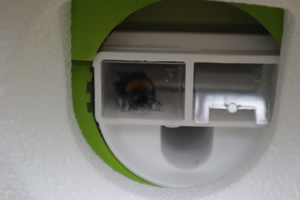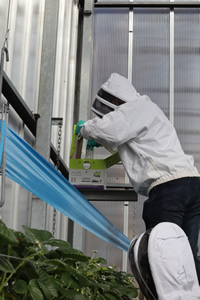Seeding Food Innovation - Awarded Project 2019
2020 Bee Vectoring--An Innovative Collaboration to Ecologically Intensify Bio-control in Strawberry Production
Project Description

In flowering crops like strawberry, growers are in the unenviable position of having to control pests with chemical pesticides that may harm the bees they depend upon for pollination. To protect bees, respond to consumer demand for pesticide-free food, and reduce pest resistance, strawberry growers are increasingly looking for alternatives to pesticides such as bio-control agents. However, bio-control agents do not act as quickly as chemical pesticides, are costly, and must be applied repeatedly. What is gained in pesticide reduction maybe lost in increased fuel and other costs. A better delivery system for bio-control agents is needed that can overcome these shortcomings to provide environmentally safe, effective crop protection.
Food Innovation

Bee-vectoring, the precision delivery of bio-control agents to flowers by managed bees as they pollinate crops, offers an exciting opportunity to satisfy consumer demand while sustainably intensifying strawberry production. Proof-of-concept is established, but uptake has been hindered by regulatory and educational obstacles which can be overcome through a strong inter-disciplinary collaboration. Our project is a collaboration among researchers at the University of Guelph, 2 companies that produce biocontrol agents, an advisor on pest-control regulations at the Ontario Ministry of Agriculture, Food, and Rural Affairs, and three farm organizations that represent berry growers (Berry Growers of Ontario), ecological farmers (Ecological Farmers of Ontario), and organic farmers (Canadian Organic Growers).
Outcome

The project's main objective is to make ecologically sound alternatives for controlling diseases and pests in strawberry available to growers by (1) supporting availability of more biocontrol agent options for the crop and (2) increasing uptake by strawberry growers of bee vectoring. We will achieve our objective by doing the necessary research to fill knowledge gaps that prevent the full registration and labeling of bio-control agents for bee vectoring on field strawberries and by evaluating the contribution of bee vectors to pollination and fruit quality of the crop. Using information from our research we will provide an economic analysis of the system for growers, outlining costs and benefits. Finally, through our farm organization collaborators, we will inform growers in plain language about the findings of our research in a variety of grower-oriented ways. As a result of the project, we anticipate the increased availability of bio-control agents for use in strawberry and an increase in uptake by growers of bee vectoring as a way to deliver bio-control agents to strawberry.
Grantees:

Ms. Dorothy Susan Chan
Susan Chan is a post-doctoral fellow at the University of Guelph. She is the lead on the 2020 Bee Vectoring Project. Susan brings together her broad academic credentials in environmental science (Ph.D. 2020), pollination biology (M.Sc. 1991), education (B.Ed. 1992), agriculture (B.Sc. 1986, Diploma 1983),
» More Info

Prof. Peter Kevan
Peter Kevan (Ph. D. 1970) is University Professor Emeritus, School of Environmental Sciences, University of Guelph. He is also Adjunct Professor and Research Associate at St. Louis University, the Missouri Botanic Garden, the Royal Botanic Garden, Hamilton, ON, and the University of Ottawa. He was Scientific Director,
» More Info

Dr. Katarina Jordan
Katerina Jordan is an Associate Professor at the University of Guelph, where she has been conducting research in plant pathology and nematology since she began in 2005. Her research has focused on fungal and nematode pathogens of a variety of plants including turfgrass, strawberries, hazelnut, ginseng, and potato
» More Info

Mr. Jim Chaput (OMAFRA)
Jim Chaputs is the Minor Use Co-ordinator for the Ontario Ministry of Agriculture, Food and Rural Affairs. As provincial minor use coordinator since 2001, Jim is responsible for coordinating minor use submissions, provincial minor use priority-setting and acting as provincial liaison between Ontario’s specialty crops
» More Info

Mr. Wayne Adams (Canadian Organic Growers)
Wayne Adams has been the Executive Director of Canadian Organic Growers (COG) since 2015. Wayne is a graduate of the University of Ottawa with an Honours Degree in Finance. After graduation he joined one of Canada’s largest insurance companies to work in financial management and eventually became the Director of
» More Info

Mr. Kevin Schooley (Berry Growers of Ontario)
A graduate of the University of Guelph in 1987, Kevin worked at the Ontario Ministry of Agriculture, Food and Rural affairs for 13 years as a fruit and vegetable specialist. In 2000 Kevin started a consulting business working with fruit and vegetable growers primarily in Ontario. Since 2004 Kevin has been Executive Director of the
» More Info

Dr. Sarah Hargreaves (Ecological Farmers Association of Ontario)
Sarah Hargreaves holds a Ph.D. in Soil Microbial Ecology from Iowa State University with experience designing and teaching undergraduate courses, graduate seminars and outreach programming. Sarah launched EFAO’s Farmer-Led Research Program in 2016. In this capacity, she supports the curiosity and innovative spirit
» More Info

Ms. Anne Hayes (Lallemand Plant Care)
Anne is Regulatory Affairs Manager (Canada) for Lallemand Inc./LALLEMAND PLANT CARE (LPC) and leads the Canadian regulatory initiatives associated with LPC’s suite of biological plant protection, biostimulation and biofertilization products. Anne has a Bachelor of Science degree from the University of California,
» More Info

Mr. Mike Dimmock (Certis USA LLC)
Michael Dimock is Vice President for Field Development at Certis USA, a leading biopesticide company based in Columbia, Maryland. He holds a PhD in Entomology (Cornell University) and has worked for over 30 years in research and development of biopesticides for use in plant protection and public health.
» More Info
[Back]